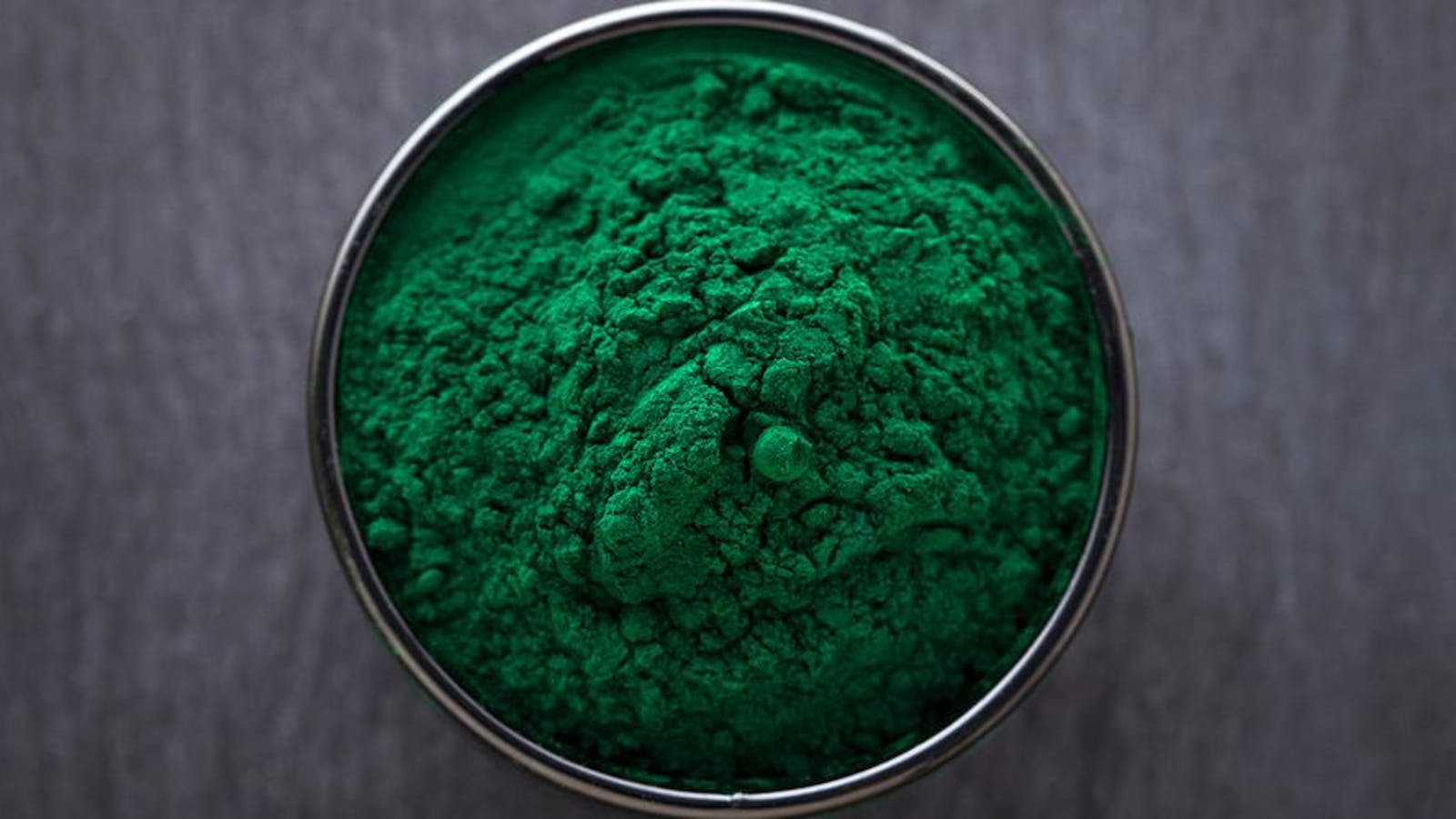Spirulina or spirulina is a spiral algae that has existed for 3 billion years. It grows naturally in lakes near the equator, in India and Chad. Low in calories, it contains a large quantity of proteins, vitamins, antioxidants (carotenoids, phycocyanins), gamma-linolenic acids (from the omega 6 family) and also iron, which is why it is particularly appreciated.
Spirulina, a healthy iron superfood
Depending on its origin, spirulina contains between 55% and 70% excellent quality proteins . This micro-algae actually contains the eight amino acids which must be supplied to our body to form proteins.
Spirulina is an important source of iron : 800 mg to 1,800 mg per kg, or 20 times more than wheat germ! This mineral, essential to our body, is therefore not only present in foods of animal origin such as meat, offal or fish.
One of the very interesting components of spirulina is chlorophyll . It has a positive influence on the production of red blood cells and purifies the blood.
Phycocyanin, an exclusive component of spirulina, also has detoxifying and immune system stimulating properties.
Spirulina also contains zinc, selenium, manganese, copper, chromium and lots of minerals (calcium, magnesium, sodium, potassium, phosphorus). It boosts the overall functioning of the body.
The cell wall of spirulina is very thin, unlike conventional sea algae. The nutrients are then very quickly and completely absorbed by the body. They are therefore easily assimilated by children and the elderly.
In short, spirulina is a micro-algae with exceptional nutritional content that requires no processing or cooking and does not cause any pollution. Thus, it is one of the best solutions for the future of healthy eating and for safeguarding the environment. Spirulina will, in fact, be an excellent vegan alternative to meat.
Spirulina, the secret of iron athletes
The purifying and oxygenating activity of pure spirulina leads to rapid and effective evacuation of pollutants and lactic acid, generated during exercise. It therefore allows for an increase in energy and faster recovery after training or after a competition. It’s great for boosting your performance!
A true concentrate of energy due to its supply of iron, vitamin B12, beta-carotene, protein and antioxidants, spirulina is therefore of great interest to athletes, particularly in terms of muscle oxygenation.
Studies carried out on several groups of athletes have clearly demonstrated that spirulina improves both endurance and recovery, and that it helps combat physical fatigue.
Spirulina, an iron algae that is not just reserved for athletes
Spirulina is an exceptional food supplement recommended for people:
- high cardiovascular risks,
- type 2 diabetics,
- having reduced or excluded animal proteins from their diet (flexitarians, vegetarians, vegan),
- on low-calorie diets,
- malnourished and anemic,
- speakers.
A 2020 study by Hélon C. Morgan and Kelly J. Moorhead concludes that it has been scientifically proven in vivo and in vitro that spirulina plays a role in the treatment of certain allergies, anemia, cancer, hepatotoxicity, viral and cardiovascular diseases, hyperglycemia, cholesterol, immune deficiency and inflammatory reactions. In short, spirulina provides all the services and throughout life!
Spirulina, how to consume it for strong health?
Generally speaking, studies of long-term consumption of spirulina suggest that it is good to take two to five grams per day. To avoid symptoms related to the detoxifying properties of spirulina, start with 1 g per day for 1 week and then gradually increase the dose over the following weeks.
How to consume spirulina if you are sporty?
- In tablets dosed with 500 mg of spirulina: 2 in the morning and 1 at 4 p.m. outside of meals the first week, then 3 in the morning and 3 at snack time in the following weeks.
- Powder : 1 teaspoon in a glass of water every morning and as a snack in a green juice, a smoothie. The taste and smell are very strong, to be reserved for the brave.
How to consume spirulina when you are a pregnant woman?
As seen previously, spirulina is a very nutritionally rich algae and perfect throughout the 9 months to support pregnancy as a fortifier.
- In tablets dosed at 500 mg: 5 at breakfast
- In flakes: 1 teaspoon at breakfast.
How to consume spirulina in case of anemia or lack of iron or iron deficiency?
Rich in iron, amino acids and chlorophyll, spirulina is ideal in cases of anemia. It's almost a complete food on its own.
- Tablets : 3 in the morning and 3 at lunchtime during the meal. They are very small, and are easy to take, in a 3-month course.
- Powder : 1 teaspoon in a glass of water or soup with meals every day. Be careful, this green powder tastes like seaweed and smells quite strong. For the bravest only!
CAUTION: if despite taking an iron-based supplement, anemia persists. It is interesting to consult a naturopath because anemia can be due to poor absorption of iron in the intestines. So, no matter how many dietary supplements you may consume, the iron will not be absorbed and will not be bound to hemoglobin.
How to consume spirulina in case of fatigue?
Rich in protein, iron and antioxidants, spirulina revitalizes and restores the body's reserves. 2 month treatment to be renewed if necessary.
- Tablets dosed at 500 mg: 2 in the morning and 1 at 4 p.m. outside of meals the first week, then 3 in the morning and 3 at snack time the following weeks
- Powder : 1 teaspoon in a glass of water every morning and as a snack in a green juice, a smoothie. The taste and smell are very strong again so this is for the brave only.
- Capsules dosed at 250 mg: 2 in the morning and 2 as a snack during meals.
WARNING SPIRULINA AND ITS DANGERS:
- Contraindication : people suffering from phenylketonuria, cancer or following anticoagulant treatment should avoid spirulina. People with high ferritin levels should also avoid taking it.
- Note: increase the doses gradually because more than 1.5 grams per day can disrupt transit and cause migraines. This freshwater algae whose iodine content theoretically does not pose any problems. In case of thyroid dysfunction, as a precaution, start with small doses and check with blood tests for TSH, T3 and T4.
- also avoid taking it in the evening which can disrupt sleep
- Also avoid consuming spirulina with tea which prevents the proper absorption of iron.
With regular use, results and effects appear after one to three weeks. It’s a great everyday supplement. There are many products in organic stores and pharmacies that are very accessible, all you have to do is find yours!
Go green! Take care of yourself.

